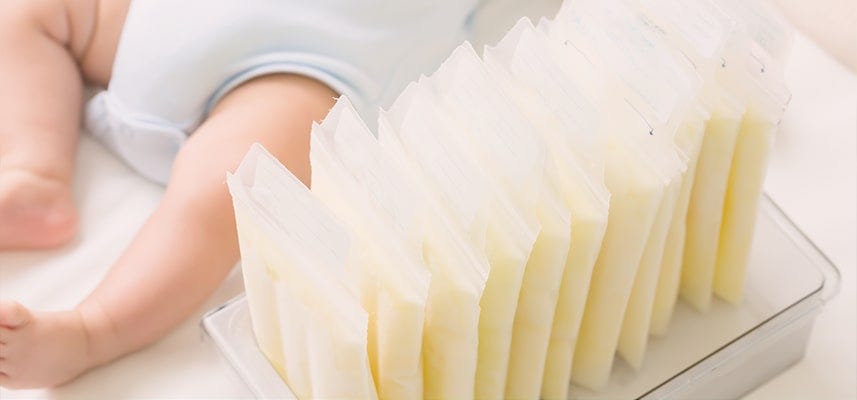The supply and demand process of breast milk production will usually lead to the right amount of milk for your growing baby. Baby asks to eat, you feed your baby, and your milk components and amount produced adapt to your baby’s fluctuating needs.
How to Prepare for Breastfeeding
How Much Is Considered a Good Milk Supply?
Should My Breasts Feel Soft After Feeding?
How Do I Know If My Newborn Is Getting Enough Milk?
Signs That Baby Is Not Getting Enough Breast Milk
When Should I Use Supplemental Breast Milk?
Have More Questions About Your Milk Supply?
Is Your Supply Actually Low?
Some circumstances may have you doubting if this system is working well for you. Here are some variations of normal:
- At different times of the day, you may have more milk than others. For hormonal reasons, this is normal.
- When managing a brief illness, your milk supply might dip a bit, but returns to normal when you are feeling better.
- You may have one breast that makes more milk than the other—also normal.
- A very stressful event could cause your milk supply to slow down, but it rebounds after the event is over. Unfortunately, the body temporarily holding back milk when under stress is normal, too.
- After returning to work, you could find that it takes a couple of weeks for your body to adjust to pumping instead of direct breastfeeding. If your milk supply catches up within those first couple of weeks apart from your baby, consider it normal.
Risk Factors for Low Supply Prior to Birth
Sometimes, there are genetic or medical reasons for low supply. Knowing you might have problems with breastfeeding and milk supply ahead of time can help you to prepare and try to prevent breastfeeding issues. If you have experienced these issues prior to or during pregnancy, it’s important to find lactation care prior to baby’s arrival to plan and troubleshoot.
- Insufficient glandular tissue (or minimal breast development)
- No breast changes during pregnancy
- Polycystic ovarian syndrome
- Thyroid issues
- Diabetes (Gestational or Type 2)
- History of breast surgery
- History of infertility
- Flat, inverted or very large nipples
- History of a low milk supply with prior births
- Obesity
- Smoking
- High blood pressure
- Anemia
- Advanced maternal age (Over 35)
- Stress
- Poor nutrition and/or not eating enough calories
- Poor hydration
- Preeclampsia
- Multiple gestation (twins or triplets)
- Planned C-section delivery


Risk Factors for Low Supply After Birth
- Retained placental fragments (when placenta pieces remain in the uterus)
- Birth interventions and/or a traumatic birth experience
- Hemorrhaging after birth
- Lack of skin-to-skin contact and separation from mother
- Baby illness, surgeries or hospitalization
- Mother illness, surgeries or hospitalization
- Use of vacuum or forceps
- No skin-to-skin contact during the first hours after birth
- Separation from mom and baby
- Delayed feedings and/or pumping sessions
Risk Factors in Newborns that Can Contribute to Low Milk Supply
- Low Apgar scores
- Meconium aspiration
- Forceps or vacuum delivery
- C/S delivery
- Prematurity (born before 37 weeks)
- Need for neonatal intensive care unit (NICU) admission
- Jaundice
- Small for gestational age (below 10th percentile for weight)
- Large for gestational age (above 90th percentile for weight)
- In-utero exposure to illicit drugs
- Exposure to sedating medications during or after delivery (including epidural anesthesia)
- Tongue or lip tie
- Poor muscle tone
- Poor or shallow latch
- Birth defects including cleft lip/palate & congenital heart disease
- Formula use
- Early introduction of bottles or pacifiers
Setting Yourself Up for Success
The most common reason for low milk supply in the first few weeks is insufficient breast stimulation or milk removal. Some mothers are unaware that they should initiate breastfeeding within 1-2 hours after delivery. With difficult deliveries, sometimes mom, baby, or both are too tired to nurse directly after. Waiting to breastfeed or pump can lead to a delayed onset of copious milk production (also referred to as milk “coming in”).
Typically, moms will notice their breasts becoming fuller and hear their babies swallowing more during feedings about 3-5 days after delivery. But, if breastfeeding or pumping did not get started right away, or if there were not enough nursing or pumping sessions in the first three days, it could take several more days before the milk comes in. Mothers need about 8-12 feedings or pumping sessions in 24 hours in the first weeks after delivery to help create a great milk supply.
Missed Feedings
If you're bottle feeding your baby, it is very important that you pump in place of missed feedings at the breast. The amount of milk you produce is driven by breast stimulation and milk removal. When feedings are missed, our bodies do not receive the signal to produce more milk, or worse, our body begins slowing down milk production because it believes less milk is needed. When supplementing is necessary, or while waiting to receive help with latching from a lactation consultant, you should use a breast pump to remove milk anytime the baby receives a bottle.
Poor or Sleepy Latches
If your baby is falling asleep at the breast or not latching and sucking properly, milk transfer may be low, causing slow weight gain for your baby and a low milk supply for you. Some newborns may be a little sleepy if they are premature, experienced birth trauma, or are affected by medications a mother uses during or after birth. If it has been three hours and your baby does not wake up on his or her own to feed, try waking up your baby and encouraging them to feed. You can do this by changing the diaper, sitting baby up and rubbing the back, or by doing skin-to-skin. If you suspect your baby is sleepy and/or has a poor latch, it is important to work with a lactation consultant who can assist you and your baby.
Medications
Be aware of what medications you are taking and how they can affect your milk production. Cold medications that contain pseudoephedrine (e.g. Sudafed) and diphenhydramine (e.g. Benadryl) might be to blame for your lack of milk supply. The fertility medication, Clomiphene, has also been shown to decrease a milk supply. Hormonal birth control methods can negatively impact milk supply. Barrier methods, such as condoms, do not. If choosing a hormonal birth control, be sure to opt for a progestin-only form of birth control, because those with estrogen can be a factor in low milk production. Ask your healthcare provider before taking any medications while breastfeeding.
Spices & Herbs
Certain spices and herbs are known to cause your milk supply to decline when used in large amounts or medicinally. Peppermint, spearmint, sage, oregano, cabbage leaves, parsley, lemon balm, and thyme are generally fine to cook with, but do not consume them in large amounts.
Cigarettes
If you smoke, it may be time to kick the habit, as it may not only hinder your milk supply, but can also cause health problems for you and your little one. However, if you do continue to smoke, you can still breastfeed. Your breastmilk has protective qualities for your baby. Do not smoke around your baby and wait as much time as possible between smoking and breastfeeding.
How to Prepare for Breastfeeding
- The first way to prepare for breastfeeding is to learn as much as you can about breastfeeding. You can do this by attending newborn care and breastfeeding classes, joining breastfeeding support groups, attending La Leche League meetings, and consulting with an International Board Certified Lactation Consultant (IBCLC) during pregnancy. One of the best ways to learn about breastfeeding is to spend time with family members and friends while they are breastfeeding. Don’t be afraid to observe and ask questions.
- Get a good lactation support system in place ahead of time. Let your partner and other household members know about your breastfeeding goals. Plan what equipment you will need (i.e. nursing pillows, pumps, etc.) and where you will sit or lie while you breastfeed (such as a certain chair or couch). Encourage your family members to receive breastfeeding education and identify ways they can participate in baby care, bring you meals, and provide opportunities for you to rest. Breastfeeding is a full-time job while you are establishing your milk supply. Try to keep your expectations low and learn the art of saying “no” to unnecessary tasks or activities. Be specific with your family members or friends about what they can do to help best support you.
- Hand expression of colostrum after feedings during the first postpartum week can help increase your milk supply. Lactation consultants, your OB/GYN, doula, or midwife should be able to provide you with education and instruction regarding hand expression.
Antenatal (prenatal) hand expression, which is done prior to delivery, is becoming an increasingly popular way to store milk in advance of baby’s arrival and have milk on hand if a mother might be at risk for having a low breast milk supply. Hand expression should never be done before 38-39 weeks and should only be started if your OB/GYN or midwife okays it—this is due to a small risk of labor being triggered by breast stimulation. Women who are at high risk of having a premature birth should avoid hand expression during pregnancy.
How Much Is Considered a Good Milk Supply?
During pregnancy: Your body starts to produce colostrum as early as week 16 of pregnancy. If you are leaking or not leaking colostrum, it is normal. When your placenta separates from the uterus after delivery, it signals your body to start sending the milk for your baby.
Days 1-2 Postpartum: You will produce a small amount of early breast milk, also called “colostrum,” during the first few days after birth. Colostrum comes in small amounts (about a teaspoon at each feeding), but it is packed with all the essential nutrition your baby needs in the first days of life.
Days 3-5 Postpartum: You may start to notice your breasts feeling full, leaking milk or you may notice your baby swallowing more at the breast. This means your milk is “coming in.” Your baby will take in about 1 oz at a feeding during this time. If you are struggling with engorgement and/or your baby is not latching well, please seek help from a lactation consultant who can guide you.
10-14 Days Postpartum: At about two weeks postpartum, you should be making about 2-3 ounces of milk at each feeding, or 16-32 ounces of milk each day.
1-6 months Postpartum: At one month, you should be making about 3-5 oz of milk per feeding (if feeding every 3 hours). For your baby to grow and thrive, they need about an ounce an hour, or at least 24-26 ounces of milk in 24 hours.
How Often Should Baby Feed?
Babies should breastfeed between 8-12 times per day. Babies may not feed off of both breasts each time, so this range includes feeds from only one breast, too. It is important to offer both breasts at each feeding even if baby doesn’t take the second breast.
You should feed your newborn whenever he or she shows signs of hunger, even if it has not been very long since the last feeding. Some newborns may have periods of feeding every 1-2 hours as their mothers’ milk supplies are being established. This can happen with colostrum in the first days after delivery. This “cluster feeding” process is normal, natural, and necessary to help you establish a great milk supply. Supplementation is not needed in the early days unless it is medically indicated. Once your milk “comes in,” if your baby is feeding for an hour at a time, seems hungry after every feeding, and/or is not content, please seek help from a lactation consultant.
Should My Breasts Feel Soft After Feeding?
Yes, your breasts should feel softer after each feeding once your milk “comes in.”
How Do I Know If My Newborn Is Getting Enough Milk?
As a rule of thumb, exclusively breastfed newborns should breastfeed at least 8-12 times in 24 hours. Watch and listen for lots of swallows. Normal newborn feedings can last from 10-45 minutes. You should also monitor your baby’s diaper output.
- Day 1: At least 1 wet, at least 1 poopy (thick, tarry meconium)
- Day 2: At least 2 wet, at least 1 poopy (dark green or brown)
- Day 3: At least 3 wet, at least 3 poopy (brown, green or yellow)
- Day 4: At least 4 wet, at least 3 poopy (yellow)
- Day 5 through 3 weeks: At least 6 wet, at least 3 large (bigger than a quarter) poopy (seedy yellow)
Newborns should also have several yellow, seedy stools per day, and at least 6-8 wet diapers per day by the time they are a week old. Additionally, newborns should be back to their birth weight by the time they are two weeks old.
Signs That Baby Is Not Getting Enough Breast Milk
- Losing too much weight (dropping 10% or more below birth weight in the first week)
- Not having many wet or dirty diapers
- Still having brown or green poops by the end of day 4
- Developing jaundice
- Being inconsolable
- Not starting to regain weight by the time they are 4-5 days old
- Infrequent swallowing while feeding
- Showing continuous feeding cues even after a feeding
- Frequent and/or long feedings after your milk “comes in”
- Sleepy at the breast
- Not content after feedings
All breastfeeding newborns should be seen by their pediatrician for a weight and jaundice check within 1-2 days of discharge home from the newborn nursery, or within a day or so of a planned home birth. Some newborns need to be seen on a regular basis in the early weeks until their mother’s breast milk supply is fully established and they have good weight gain.
When Should I Use Supplemental Breast Milk?
If your newborn’s provider determines that supplementation is needed, options include pumped breast milk, pasteurized donor breast milk, and infant formula. Supplemental feedings can be given by bottle, finger (syringe) feeding, droppers, cups, or supplemental nursing systems. The Academy of Breastfeeding Medicine has evidence-based guidelines for when to supplement and how much supplemental breast milk or formula should be offered per feed.
How to Increase Milk Supply
If you need to increase your milk supply, there are many options. Here are 7 ways you can increase your milk supply naturally.
Tip #1: Increase Feedings
Sometimes, increasing your milk supply is as simple as feeding the baby more frequently. Newborns should be eating at least 8 to 12 times per day. If you are scheduling feedings or allowing your baby to go more than 2-3 hours between feedings during the day, start waking your baby up and offering the breast more often. Feeding frequency is timed from the start of one feeding to the start of the next. For example, if your baby fed at 12 p.m. and again at 3 p.m., your baby is feeding every 3 hours.
Tip #2: Get Help with Latching
If you are experiencing pain while your baby nurses, the latch is shallow, you do not hear swallowing, or your baby is making clicking sounds while feeding, chances are your baby is not latched correctly. An incorrect latch can limit the amount of breastmilk a baby can transfer and can eventually lead to a decrease in milk production. Sometimes, it is as simple as correcting your baby’s positioning or helping your baby open his or her mouth wider to take in more of the breast tissue while feeding.
Tip #3: Pump After Feedings
Since breast stimulation and milk removal is the key to increasing milk production, it can be helpful to begin pumping after feedings for about 10-15 minutes to signal your breasts to make more milk. Even if you do not get a lot of milk when you are pumping, you will increase the demand on your milk supply, which can lead to an increase in milk production. To make pumping easier, allow you to double pump, and to help your breasts receive adequate stimulation, we recommend using a hospital grade double electric pump with a hands-free pumping bra. Only add pumping after feedings with guidance from a lactation consultant.
Tip #4: Use Your Hands
While pumping or breastfeeding, it is important to use your hands to massage your breasts. Breast compressions increase milk flow, leading to increased milk transfer when breastfeeding and more milk output when pumping. The most effective way to do breast compressions is to start massaging near the back of the breast/chest wall and gently work your way down the breast towards the nipple. Be careful not to massage your breast too closely to the nipple while your baby is feeding because it can break their suction at the breast. Allow your baby to get a deep latch before massaging the breasts, and always use gentle pressure.
Tip #5: Drink More Water
While breastfeeding or pumping, you may notice an increase in thirst. This is because making breast milk requires a lot of water. It is recommended that breastfeeding and pumping moms drink to quench their thirst, which usually means drinking at least 100 ounces of water per day. Every time you sit down to breastfeed or pump, have water next to you to drink.
Tip #6 Eat Well
Your body requires more calories and nutrients to keep you and your baby nourished and healthy. Limiting calories or not eating enough nutrient-rich foods can affect the quantity of breastmilk produced. Breastfeeding mothers need to take in an extra 300-400 calories per day, depending on their activity level. Your body needs enough “fuel” to produce milk. You can read about breastfeeding superfoods that can help boost milk supply!
Tip #7: Get Help When You Need It
The great news is that most newborns come ready and able to breastfeed well. While you and your baby are learning the “how to’s” of breastfeeding, seek help early and often from a lactation consultant who can help you get the best latch, find the right nursing position, ensure your baby is transferring milk well, and help you create and maintain a good milk supply. Lactation consultants should be available to you at the hospital—just ask! Many insurances will cover in-home or virtual consultations as well.
Have More Questions About Your Milk Supply?
No worries! We’re here to help. Please feel free to reach out to our trained breastfeeding professionals at Aeroflow for assistance. We’re happy to answer all of your questions or refer you to someone who can.
If you are struggling with low milk supply and need a high-quality breast pump, you may be able to get one at little to no cost to you through your health insurance provider. Aeroflow Breastpumps can help you quickly and easily find out if your insurance covers a pump after you complete our Qualify Through Insurance Form. Your specialist will contact you to discuss your coverage details and share all of your breast pump options. Once you choose which breast pump you would like to order, Aeroflow Breastpumps will ship it to your home free of charge.
References
- ACOG Committee Opinion. Number 820. Committee on Obstetric Practice Breastfeeding Expert Work Group. Obstetrics and Gynecology. 2021. 137(2): e42-e52.
- Bonyata, K. (2019, March 10). Do breastfeeding mothers need extra calories or fluids? • kellymom.com. KellyMom.com. Retrieved March 4, 2023, from https://kellymom.com/nutrition/mothers-diet/mom-calories-fluids/
- Centers for Disease Control and Prevention. (2022, May 17). Maternal diet. Centers for Disease Control and Prevention. Retrieved March 4, 2023, fromhttps://www.cdc.gov/breastfeeding/breastfeeding-special-circumstances/diet-and-micronutrients/maternal-diet.html
- Cough & cold medications while breastfeeding. InfantRisk Center. (n.d.). Retrieved March 4, 2023, from https://www.infantrisk.com/content/cough-cold-medications-while-breastfeeding
- Flagg, J. and Busch, D. Utilizing a Risk Factor Approach to Identify Potential Breastfeeding Problems. Global Pediatric Health. 2019. 6: 1-5.
- How often and how much should your Baby Eat? HealthyChildren.org. (n.d.). Retrieved March 4, 2023, from https://www.healthychildren.org/English/ages-stages/baby/feeding-nutrition/Pages/How-Often-and-How-Much-Should-Your-Baby-Eat.aspx
- Kellams, A., Harrel, C., Omage, S., et al. ABM Clinical Protocol #3: Supplementary Feedings in the Healthy Term Breastfed Neonate, Revised 2017. Breastfeeding Medicine. 2017. 12(3): 1-11.
- Meek, J. and Noble, L. Policy Statement: Breastfeeding and the Use of Human Milk. Pediatrics. 2022. 150(1): e2022057988.












